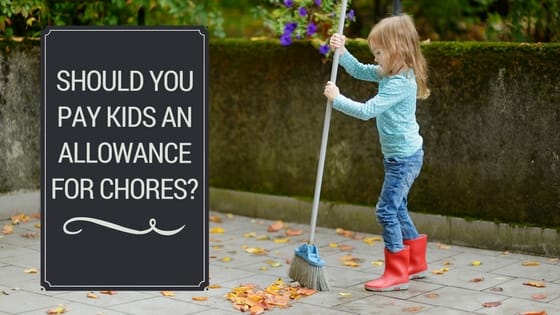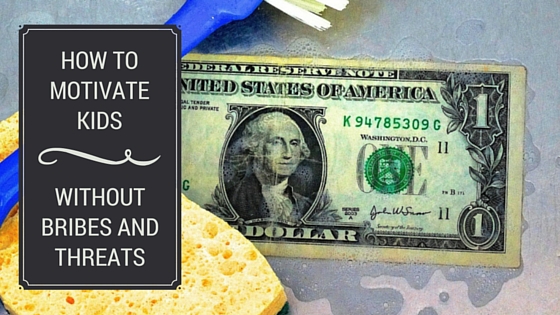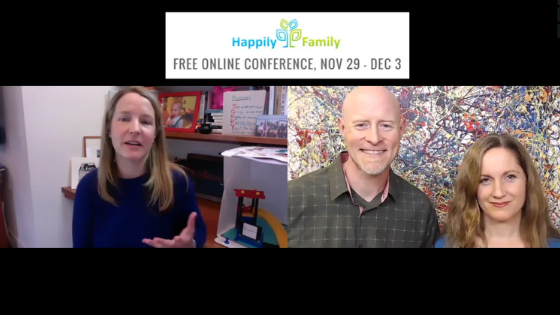We like it when kids–especially our own–do chores around the house. One of our daughters is a master at cleaning the bathroom. The other one takes out the recycling, the trash, and does all the cat care. They both help with the dishes and setting the table.
But we don’t pay our kids for doing these chores.
We don’t have a problem with giving kids an allowance; we are “pro-allowance”. But we don’t think kids should earn an allowance for their chores.
Sound crazy?
Here’s what the research says:
Rewards don’t work in the long term.
Alfie Kohn in his book Unconditional Parenting says, “a considerable number of studies have found that children and adults alike are less successful at many tasks when they’re offered a reward for doing them–or for doing them well.” Students tend to learn better when there are no “A’s” to earn. Rewards are remarkably ineffective at improving the quality of people’s work or learning.
Rewards often only buy temporary compliance
If I gave one of my kids an allowance to scrub the toilet. She’d probably do it* but only as long as I keep paying her. Once I take that reward, she wouldn’t continue to scrub the toilet. Same with adults, we usually don’t continue to work at a job if our boss stops paying us.
*I’ve actually tried to pay my kids to do extra things around the house that are “above and beyond” their normal chores. They looked at my money, considered the amount of effort involved in the task, and they both said, “No thanks!”
The same is true of punishments. My kids would probably scrub the toilet if I took away their video games. But once I gave them access to games again, they probably wouldn’t continue to scrub the toilet.
Rewards might even be counterproductive
One study found that kids who were rewarded for being “nice” to another child, didn’t then think of themselves as “nice” people and were less likely to repeat that behavior in the future.
So, rewarding a child for a chore makes it less likely that they will do the chore in the future, and this is because…
Rewards erode intrinsic motivation
Intrinsic motivation is the inherent joy found in doing something for it’s own sake. For example, I practice piano because I enjoy playing piano. I eat green veggie because they taste good. I’m nice to my friends because I like how it makes me feel. I scrub the toilet because it helps the family, I’m proud how it looks, and it smells good afterward!
There are scores of studies that conclude “the more that people are rewarded for doing something, the more likely they are to lose interest in whatever they had to do the get the reward.”
Maybe your kids don’t like scrubbing the toilet, we understand. Us too! However according to the research they will enjoy cleaning the toilet more, if they don’t get paid to do it.
Without payment a child is more likely to think, “I’m really a great helper. I’m a hard worker and now it’s clean. This was actually kind of fun.”
In conclusion: Give your child an allowance, it’s part of the family’s contribution TO him. AND give your kids chores it’s part of his contribution TO the family. But don’t give your kids an allowance BECAUSE they’ve earned it with their chores. Kids “earn” allowance just for being in the family, for being themselves.
Is it hard to motivate your kids to do things (chores, homework, etc) they don’t want to do? Check out this blog post about that.
Now we’re curious about you. Do your kids earn their allowance? Why or why not? Do your kids do chores? Do they get rewarded for doing them? Or not? Share below.









yes
Should children be taught that money and work are separate entities, or is it important for them to learn the value of earning money through completing tasks and responsibilities? How can parents strike a balance between teaching financial responsibility and instilling a strong work ethic in their children?”,
“refusal
I don’t think they are mutually exclusive. There is some work that comes with a paycheck, there is other work that might not but it’s still worthwhile and valuable despite that. I believe a strong work ethic comes from doing things that are meaningful and fulfilling, following your passion.
I just can’t disagree with this more. I was the only one of my friends growing up that would be paid for chores. I’m also the only successful one out of all of them. All four of us were raised dirt poor and all four of us own our own businesses, save our money and invest it. Earning money is the NUMBER ONE money management skill, saving and then how to spend it come after. I just can’t help but laugh at this idea. I have four kids and raised them the same. They help without being asked, they save their money and they enjoy being paid for certain chores, but understand when we can’t do that. You have to teach them with a variety of lessons. Handing them money creates kids that don’t want to do anything because it just won’t matter. Now my friends in adulthood all complain about their kids throwing fits to do chores. I’ve never dealt with that with my 4.
Sounds like you’ve found something that works well for you and your family. Thanks for sharing your experience.
OK not sure if anyone is going to see this comment. I am trying to understand how to motivate my young children to keep their room clean. I see the points being made in this article about rewards. But I have to say I am not just giving my kids an allowance for being them. Nobody pays me for just being me. I have to go to work to get money. My kids right now I feel are too young for an allowance but when we get there I do believe it has to be earned.
Hi, Gina. Another option is skip the allowance all together and just start teaching how to keep the room clean. If they’re young money/allowance might be too abstract anyway. You can start by helping them clean up, and playing clean up games. Here are a couple blog posts that give more information are https://www.happilyfamily.com/clean-up-games/ and https://www.happilyfamily.com/how-to-motivate-kids-without-bribes-and-threats/
Thank you for this post. So it sounds like you don’t pay anything for basic chores and then only pay for above and beyond chores? Or am I miss understanding this?
Also, how do you take into account behavior if that is an issue and helping to reward and have consequences for poor behavior?
We also have an issue with doing the chores without being nagged. How do you track and ensure they get done, and then give rewards or consequences if things don’t get done as we have a child that claims ignorance on a lot of basic things and as he gets older we need him to just start brushing his teeth every day.
That’s right, Brian! :)
Thank you for the article as I’m looking for some direction with my step-son. Can you clarify a little for me? As I’m reading through your post and comments it appears you are not paying your children for doing standard chores, but you do pay them for the above and beyond chores, is that correct? If this is correct, do you still pay them a set allowance each week no matter what that is a base pay before the above and beyond allowance to teach them about money management?
Also, how do you get your kids to get all the basic things done that they need to do like brushing their teeth, making their bed, etc. We have tried everything mentioned here and our son seems to just be forgetful or take little pride in getting it done. So we are constantly reminding him and it is a strain for us and him. Would you suggest a chore chart that he would need to complete. And what happens if he does or doesn’t complete it? Are there rewards for doing it (even though these are the basic things he just needs to do) or punishments for not doing it. I read your other article about motivation and we have tried all that already, he just doesn’t seem to care and claims poor memory.
Also, how do you take into account behavior? We have a big challenge right now with behavior even though he is 10 in how we treat others and adults with respect, having manners, etc. How do we work on these behaviors and continue to instill them or recognize when he has done a really good job and discipline when it’s a problem.
Thank you and appreciate your thoughts.
This is similar to how things work in our family. The kids do certain chores to contribute to the family that are unpaid. If they want to earn extra money, for doing work “above and beyond” then we offer them other chores that are paid.
This is exactly how we do things. The hilarious thing is when my husband and I realize, “man! That “extra” job is super helpful. I hope they choose to do it this week!”…lol.
Agreed, Dr Willis! I love it when the “extra” jobs get done!
My reasoning for not tying chores to allowance is really simple: allowance is about learning money management skills. It’s an opportunity to learn how to build and maintain wealth. It is NOT a tool to use to gain compliance in other areas of my son’s life. My reasoning works regardless of parenting style or our beliefs/the evidence about rewards/punishment. Kids need to have practice with money to build good money habits. And they don’t get much practice if you withhold money. I feel like chores and allowance are just two separate things and that we parents should employ different strategies for teaching the skills and habits related to these things to make them successful adults.
Furthermore, when you tie the allowance to chores, you’re telling your kids that only WORK is considered valuable. Do we all want to raise our children to become laborers? Some of us want our kids to feel like they can contribute to society through things that don’t always earn (lots of) money (right away), like art, music, literature, teaching, caring for children and the elderly, etc. And we want to teach that there are different ways to make money, too, like investing. It doesn’t have to just be hard manual labor that can earn money.
In our family our son gets a weekly allowance. That money is divided up into 3 categories: spending, saving, and sharing. The saving is for very long-term things like college. The spending is for whatever he wants that we won’t buy him (video games, candy, and, I kid you not, lawn ornaments). And the sharing is for various types of charity things (he has donated to the Humane Society and he has used it to buy friend’s gifts ‘just because’). So far it works for us :)
You’ve got so many great points in here, Elaine! Bravo!! Love it!
i love this. the giving would really make them feel good. good habit to instill too. i wish i were taught this as a child! It could have 1) given me the peace of mind and secure feeling (of having savings – which i’ve never been able to do), 2) appreciated my “spending” money that much MORE… and 3) it would create the good endorphins inside me while giving to my friends or a cause i felt passionate about.
Agreed with all 3! At least we can do the things with our kids that we didn’t get growing up, Liz!
I’ve heard that by saving a dollar a day for 20? years that, with compounding interest, it adds up to $1 million. I can’t figure out how to do the math, but if it’s true you son could be a millionaire! :)
This is a tough one. I grew up not doing any chores. My husband grew up always doing chores. When I became an adult, my lack of chores didn’t really affect who I was because I’m very responsible.
We’ve always given our 4 kids allowances that aren’t tied to chores. But I didn’t start having our kids really pitch in on chores till recently (in last year) when I realized that our 3 boys and 1 girl sometimes didn’t know how to do basic things around the house. It’s been a huge help to me since they can take care of things I used to have to do.
However, screen time had become a problem, especially with the 15 yo. So I recently made a rule that additional screen time beyond the standard amount per day would require extra work around the house. My 9 yo daughter and 12 yo son basically haven’t bothered to do extra chores.
It has motivated the 15 yo to do extra things and that’s helped with his constant asking for more time. Now he’s more likely to accept his screen time is done and not bug us. We’ll see if it helps in the long run.
Interesting strategy, Liz! Thanks for sharing! xox
Loosely related: a friend’s family had a policy about gifts of money (birthday, holidays) — if the child saves half of the money in the bank instead of spending, the parents would match that half, to put in the bank also. She said it encouraged her and her siblings to focus on saving and planning for the future, particularly with unplanned windfall money.
The same family, for camps and class trips, would require the child create a budget for the trip, and would give the child the amount he budgeted for, even if it was insufficient. (Older kids, like age 11+) This allowed the children to learn through experience in a safe environment (example:When her brother asked for $30 for snacks, lunches and souvenirs for a week-long team ski trip, without budgeting or estimating–and ran out of cash before Tuesday–he learned the valued in planning. His lodging, other meals and lift expenses already were paid for on the trip, so the only damage to him was the loss of what he desired, not what he needed to keep him healthy.). What happened was the children became strong planners, savers and budgeters.
Nice ideas, Bug. It could be a whole new blog post on the topic!
Thanks, Rochelle!
Tara, thanks for contributing your thoughts here. I think we can both agree that it’s important to value another’s time and effort and to foster intrinsic motivation whenever possible. :)
You only focused on the negative aspects.
Would you like to talk about the positive aspects, Jaela?
Thank you for this post and I agree with you.
My question comes with how much is ok for a allowance for a 11 and 8 year old as the times from my childhood to theirs has changed so much and what are the conditions to it. I don’t relate chores to allowance though by giving them an allowance there are some changes to be made for me to buy things I used to do when no allowance was in place.
Any thoughts for me?
Claudia, I’ve not seen any research on how much to give. An article that I read years ago recommended kids get between 50 cents and $1 per week for each year of their age. Meaning a 5 year old could get between $2.50 and $5/per week. AND she had her kids, as they got older, use that money for their clothes, trips to the movies, etc, so her adolescents weren’t constantly asking, “Mom, can I have $5 for ice cream?”
<3
You too!
Thank you for this article. I feel the same way about rewards. I gave my children and allowance but it wasn’t based on the chores. They were expected to do chores simply because they lived in the house and were part of the family. I was a single mom and my kids had to contribute. Their allowance wasn’t much but they could use it buy school supplies, lunches, snacks, etc. We always had food to pack lunches fi they chose to do that and save their lunch money. To me an allowance is a way for kids to learn how to budget their money. For example, tithe first, saving some, purchasing items, etc.
I’ve done a lot of research on reward systems myself. Just did a workshop for a California children’s conference called, “A Class without Stickers, Are You Kidding Me?” My research shows the same as yours. Not only does productivity go down but rewards create “other” control. Kids don’t learn to budget their time, control their emotions, etc. when someone bigger than them is making a judgement about whether they get a reward for their actions. Thanks again. Spot on!
Thanks, Linda! Sounds like a great workshop!
Our kids do chores for being part of the family, and there are extra chores they can do for money. We spend a lot of time working on what they need to do to take care of themselves, laundry, putting there dishes away, keeping their room picked up so they can find things. And then they are each in charge of keeping a household room picked up. Allowances come but often in the form of using the “mom bank”. They keep track in their head. It sort of works. Really struggling with my oldest. He wants major items (phone, game long device). Our policy is we will give them the jobs to earn the money for such things but we will not be buying them, not even for birthdays. This has had the opposite effect. No desire to earn it. Suggestions?
Becky, for large items, like phones, we often split the cost. For example, we split the cost of concerts, sports teams, art classes, theatre activities, and even summer camps (unless we need the child care then we pay it all!). With phones, when they are at the right age, they pay for the phone, we pay for the plan. That way they take care of the phone.
Yes! Making that mistake too.
Even ‘worse’ we give them a % of their allowance for the amount of chores achieved. Their allowance is not much. We support them financially well enough they don’t need the cash.We feel it’s about learning that effort=recognition/reward.
We often forget to keep a record and forget too. It’s a pretty awful ‘system’ really. I find it hard to just give them money they have not earned- and what for anyway?
In the same boat.
My kids get an allowance to let them learn how money works and how to save for something they want. They love spending their “own” money. Don’t buy them stuff that they don’t need, save for birthday and Christmas presents. Read “The Opposite of Spoiled” to get some perspective. Here’s an article by the same author that explains the approach pretty well: http://www.slate.com/articles/business/moneybox/2015/02/kids_allowances_you_re_doing_it_completely_wrong.html
They do things to help us out, but we don’t even call them “chores”. It’s just something they do to help. And they enjoy it. :)
Love this! Yes!
Clare, I agree that effort deserves recognition. We recognize our kids by appreciating them on the nice job that they did cleaning up. Our kids often use their own money for movies, lessons, classes, etc or we’ll pay half and they pay half.
I hear what you are trying to say with this concept, however, I respectfully disagree with your comparisons.
Not all work “must” come with intrinsic rewards. Sometimes, we do things because they need to be done, not because we enjoy doing them. Sometimes – as with children – we can’t even appreciate the reward of doing them… (like cleaning the litter box or scooping dog poop) because the disgust to some kids completely overrides the pleasantries afterward.
The families I work with are not encouraged to give an allowance because we encourage families to value one another’s time and effort (which is what we believe “putting your kids on your payroll” does)
We also encourage a family budget…when a child’s “wish” is above and beyond that budget, they must earn the cash to cover the delta.
I feel that rewarding for grades or kind behavior is – as you stated – counterproductive. However, paying for work completed or initiated without having to ask…that’s worth every penny to me and shows my kiddos that their time and effort has value.
I appreciate the clarity in these sentiments…
Give your child an allowance, it’s part of the family’s contribution TO him. AND give your kids chores it’s part of his contribution TO the family. But don’t give your kids an allowance BECAUSE they’ve earned it with their chores. Kids “earn” allowance just for being in the family, for being themselves.
Thank you!
You’re welcome, Amy!